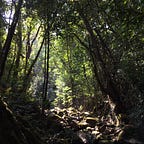Living Spaces
Last night I watched a documentary called Soufra which was being aired as a part of Indian Institute of Human Settlements’ (IIHS) Urban Lens Festival which is an annual festival that showcases films that discuss themes of living and lived spaces.
Soufra is a story of a group of women, led by Mariam who dreams of starting a food business to generate income in Bourj el Barajneh, a refugee camp near the outskirts of Beirut. This refugee camp houses families of Palestinians who had to flee the country for a better life. The communities are constantly struggling to make ends meet and because of a lack of official status cannot find stable employment. This plays out in Mariam’s story, as she raises money with the help of a humanitarian organization but cannot use the money to buy a truck for her food truck business because the ministry would not issue her a license to start a food business. Although by the end of the documentary many hoops are jumped and she eventually gets her truck and license, her success is probably one of the very few or rare ones.
What struck me most about this film, is the lack of mainstream discourse on refugees. I don’t remember growing up either learning much or being encouraged to think about living spaces and what creation of these boundaries does to humans. Autonomy only goes as far as privilege and in war zones like Palestine, Syria and more recently Afghanistan amongst others, privilege is tied into the ability to leave a country to move to another as an official immigrant or documented refugee and have the opportunities to improve quality of life. And this is a recurring theme across the world, but the narrative was largely absent in my spaces growing up.
A couple of books I read this year (Pachinko by Min Jin Lee, and Reading Lolita in Tehran by Azar Nafisi — separate story on these) talk about similar themes, such as trauma of separation from one’s country of origin, trauma of living in war zones, trauma of rejection in a new territory, lack of recognition of the complex identities that people bear, lack of dignity and lack of quality of life for refugees who cannot find a way out due to poverty traps. Intersectional inequity is a very deep and complex issue and not often articulated in the mainstream.
What do living spaces mean? What is the relationship that land has with humans and how has capitalism drastically changed the age-old relationship that the natives had with land? A podcast that I listened to a while back hosted by a couple of indigenous folx called “All My Relations”, summarized an episode discussion beautifully —
“in abusing the land around us, we are abusing ourselves and our bodies. And healing of land would lead to healing ourselves”.
~Varsha
